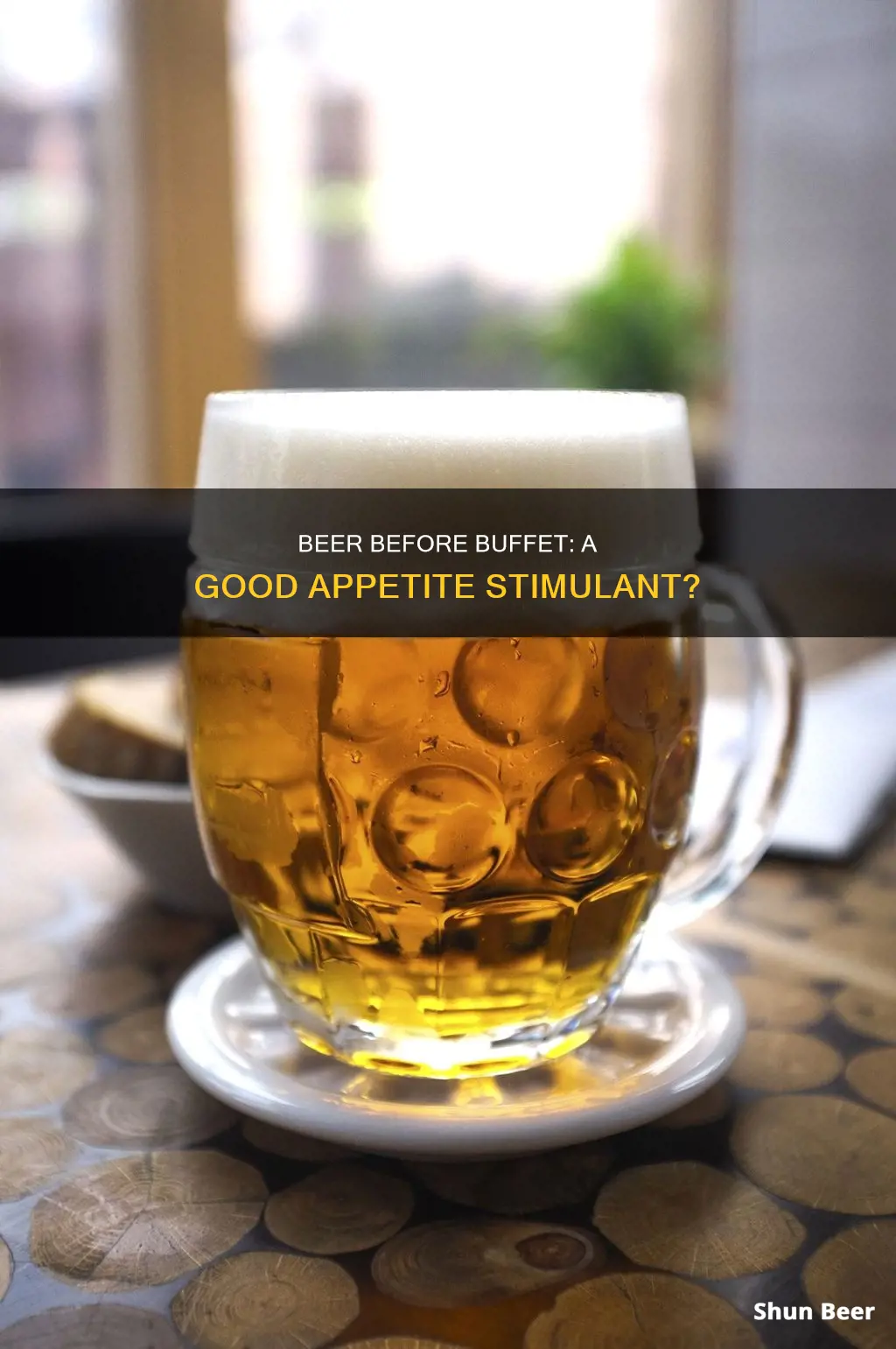
Drinking beer before a meal can be enjoyable, but it's important to understand the potential impact on your body. Alcohol absorption is faster on an empty stomach, and while some people prefer the quicker intoxication, it can lead to unpleasant side effects and health issues, especially if done regularly. So, is it okay to drink beer before a buffet? Well, that depends on a few factors. Firstly, consider your health; if you have a sensitive stomach or digestive problems, drinking on an empty stomach may worsen these conditions. Secondly, think about the potential consequences; drinking before eating may lead to more rapid intoxication and unpleasant side effects like nausea and vomiting. Finally, reflect on the occasion; if you're driving, or have something important to do, it might be best to wait until after the buffet to drink. Ultimately, the choice is yours, but drinking in moderation and being mindful of your health status will help ensure a positive and enjoyable experience.
| Characteristics | Values |
|---|---|
| Drinking beer before a meal | Beer can be consumed before a meal if one doesn't mind getting drunk quickly and doesn't have to drive or do something important. |
| Drinking beer on an empty stomach | It is okay to drink beer on an empty stomach occasionally if one doesn't have health conditions like digestive problems. |
| Beer with food | Beer lovers claim that beer tastes better with food, especially with a carb-packed meal. |
| Drinking beer after a meal | Drinking beer after a meal lowers the chance of damaging the liver as the alcohol absorption rate is slower. |
| Beer and weight gain | Drinking beer before a meal can stimulate appetite and make one overeat, leading to weight gain. |
What You'll Learn

Drinking beer on an empty stomach gets you drunk faster
Drinking beer on an empty stomach will cause alcohol to be absorbed into the bloodstream more quickly. This is because there is no food in the stomach to slow down the passage of alcohol into the small intestine, where most of it is absorbed. As a result, drinking beer on an empty stomach will lead to faster intoxication and more intense effects.
How alcohol is absorbed into the body
When you start drinking alcohol, a small percentage will enter the small blood vessels in the mouth and tongue. Once the alcohol reaches the stomach, up to 20% will be absorbed into the bloodstream. The remaining 75-85% is absorbed into the bloodstream as the alcohol passes into the small intestine.
The role of food
Food acts as a barrier, slowing down the absorption of alcohol in the small intestine. This delays the process and mitigates the rapid rise of alcohol in the bloodstream. Therefore, drinking on a full stomach will allow you to enjoy the moderate effects of your beer for longer.
Health considerations
Drinking beer on an empty stomach can lead to health issues and more unpleasant side effects related to a hangover, such as a bad headache, nausea, liver problems, inflammation, heart disease, and stroke. It can also increase your risk of developing a serious health problem. Therefore, it is recommended to drink in moderation and to avoid drinking on an empty stomach too often.
Tips for drinking beer safely
To drink beer safely, it is important to drink in proportion to your personal tolerance for alcohol and to avoid drinking too much or too quickly. It is also recommended to wait at least an hour after a meal before drinking beer and to avoid drinking more than one standard drink per hour. If you are drinking on an empty stomach and start to feel unwell, it is important to stop drinking, drink water, and eat easy-to-digest foods with carbohydrates.
Enjoying Beer at the Beach: Is It Allowed?
You may want to see also

Beer tastes better with food
Beer and food are a match made in heaven. Not only does food slow down the absorption of alcohol, but the right food can also complement and enhance the flavour of your beer.
Firstly, it's important to understand the basics of alcohol absorption. When you drink on an empty stomach, the alcohol passes quickly from your bloodstream to your small intestine. As a result, your body absorbs most of the alcohol in a short amount of time, leading to faster intoxication. Eating before drinking can significantly alter this experience. Food acts as a protective barrier, slowing down the absorption of alcohol in the small intestine, allowing you to enjoy your beer at a more moderate pace.
Now, let's talk about why beer tastes better with food. Beer is known for its complex flavours, ranging from bitter to sweet, nutty to caramel, and everything in between. When pairing beer with food, it's all about finding harmony between these flavours. Here are some general guidelines to consider:
- Contrast: Look for a strong, dominant flavour in either the beer or the dish, such as sweet, rich, or oily. For example, oysters have a strong, briny flavour that pairs well with the rich and chocolatey notes of a stout.
- Complement: This is one of the simplest ways to create a delicious pairing. Match rich foods with heavy and flavourful beers, like stouts or porters. Conversely, pair light dishes with light beers, such as salads and fish with wheat beers or lagers.
- Cleanse: Beer can be a great palate cleanser, especially with bold or intense flavours. For instance, a light beer can help wash down the heat of spicy Korean fried chicken. Similarly, fatty foods like French fries can balance out the bitterness of an IPA.
- Avoid Overpowering Flavours: Be mindful of the flavour intensity in your food and beer. Medium and dark beers, for example, have robust flavours that can overpower certain types of food. A pint of Guinness might not be the best choice with a delicate piece of salmon.
- Burgers and steak: Go for a darker, heartier beer like a brown ale or stout to balance the bigger meats.
- Spicy foods: Light lagers or Indian Pale Ales (IPAs) are a great choice to help cut down the spices in the food.
- Fried foods: Opt for a light German lager or a Belgian blonde ale to help cleanse your palate without washing away all the salty, crispy flavours.
- Cheese: Beer is one of the best matches for cheese! The carbonation in beer creates a lighter acidity that lifts the fats in the cheese. Almost any beer will go well with cheese, but for stronger cheeses like goat or blue cheese, reach for a darker lager or ale.
- Dessert: Stouts with chocolate notes are a perfect pairing for brownies or any rich dessert. Alternatively, lighter, fruit-based lagers or ales can provide a nice contrast, evoking flavours of raspberries and chocolate.
So, the next time you're planning a meal or heading to a buffet, keep these tips in mind and get creative with your beer and food pairings. Remember, it's all about finding that unique combination that delights your taste buds!
Beer After Best Before Date: Is It Safe to Drink?
You may want to see also

Drinking on an empty stomach can lead to health issues and hangover side effects
Drinking on an empty stomach can lead to a range of health issues and hangover side effects. Alcohol is absorbed more rapidly on an empty stomach, as it passes quickly from the bloodstream to the small intestine when there is no food to slow it down. As a result, the body absorbs most of the alcohol in a short amount of time, leading to faster intoxication. This can cause impaired coordination, slowed brain function, and listlessness.
Drinking on an empty stomach can also lead to more unpleasant side effects, such as a bad headache, nausea, liver problems, inflammation, heart disease, and stroke. In addition, drinking on an empty stomach can increase the risk of a hangover, with symptoms such as dizziness, inability to concentrate, mood issues, and sensitivity to light and sound.
While drinking on an empty stomach may not be a problem for some people, it is important to be mindful of the potential health risks and side effects. It is recommended to drink in moderation, proportional to personal alcohol tolerance, and to avoid drinking on an empty stomach too often to reduce the risk of developing serious health problems.
To drink more safely on an empty stomach, it is advisable to drink slowly, not consume too much, and be aware of signs of intoxication, such as difficulty balancing or increased aggression. Additionally, eating a light meal of carbohydrates and proteins before drinking and light snacks during drinking can help slow down alcohol absorption and reduce the risk of negative consequences.
Beer and Ulcerative Colitis: What's the Verdict?
You may want to see also

Drinking after a meal lowers your chance of liver damage
Drinking alcohol on an empty stomach can lead to faster absorption of alcohol into the bloodstream, resulting in more intense and faster-acting effects. This is because, without food in the stomach to slow it down, alcohol passes quickly from the bloodstream to the small intestine, which has a larger surface area.
On the other hand, consuming alcohol after a meal can significantly alter the experience. Food acts as a protective barrier, delaying the absorption of alcohol and mitigating the rapid rise of alcohol in the bloodstream. This means that if you have a meal before drinking, you can enjoy the moderate effects of your alcoholic beverages for longer.
Drinking after eating is much safer as it gives time for the food you've consumed to slow down alcohol absorption and prevent inflammation and complications such as liver damage. Alcohol consumption is one of the leading causes of liver damage, and drinking after eating lowers your chance of damaging your liver.
The liver is one of the most complex and resilient organs in the body, capable of regenerating itself. It has many vital functions, including breaking down drugs, alcohol, and other potentially toxic substances, producing bile to aid in fat digestion, storing nutrients, and making proteins essential for blood clotting. However, each time the liver filters alcohol, some liver cells die. Prolonged alcohol misuse over many years can reduce the liver's ability to regenerate, resulting in serious and permanent damage.
Alcohol-related liver disease (ARLD) is a common condition with several stages of severity and associated symptoms. It often goes undiagnosed until the liver has been severely damaged, and symptoms can include jaundice, swelling in the ankles and abdomen, confusion, and vomiting blood. The best treatment for ARLD is to stop drinking, preferably for life.
To maintain liver health, it is recommended to eat a healthy diet rich in fresh produce, whole grains, and lean protein, while limiting sugars, unhealthy fats, and refined carbohydrates. Regular exercise can also help reduce excess fat in the body and the liver. Additionally, it is crucial to manage weight as obesity increases the risk of alcohol-related liver disease.
In conclusion, drinking after a meal is preferable to drinking on an empty stomach as it lowers the chance of liver damage by slowing the absorption of alcohol and giving the liver time to process it effectively. This helps to prevent inflammation and the accumulation of scar tissue, which can impair the liver's vital functions.
Goa's Beachside Beer Drinking - What's the Deal?
You may want to see also

Eating before drinking slows the absorption of alcohol into the bloodstream
When you drink on an empty stomach, the alcohol passes quickly from your bloodstream to your small intestine. The small intestine has a large surface area, allowing for the quick absorption of alcohol into the bloodstream. As a result, your body absorbs most of the alcohol in a short amount of time, leading to faster intoxication.
On the other hand, when you eat before drinking, the food in your stomach slows down the transfer of alcohol from the stomach to the small intestine. This delay gives the enzymes in the stomach lining more time to inactivate the alcohol. Additionally, the presence of food decreases the speed of alcohol travelling to the liver from the small intestine. This allows the liver to metabolise the alcohol more efficiently before it enters the main circulation, resulting in lower blood alcohol concentration (BAC) levels.
The type of food consumed also makes a difference. Foods high in fat and protein, such as cheese, nuts, and meats, tend to slow down the absorption of alcohol more effectively. On the other hand, foods high in carbohydrates, such as pasta and bread, can help maintain a more consistent BAC level over time.
It is important to note that while eating before drinking can slow down alcohol absorption, it does not eliminate the effects of alcohol entirely. The only way to ensure a BAC of zero is to abstain from drinking alcohol altogether. Responsible drinking habits, including moderation and understanding one's limits, are crucial for overall well-being.
Non-Alcoholic Beer: Safe for Minors in Canada?
You may want to see also
Frequently asked questions
Drinking on an empty stomach will get you drunk faster, which may be dangerous. It is recommended to eat something before drinking to slow down the absorption of alcohol into the bloodstream.
Drinking on an empty stomach increases the rate at which alcohol is absorbed into the bloodstream and travels throughout the body. This can lead to unpleasant side effects and health issues such as a bad headache, nausea, liver problems, inflammation, heart disease, and stroke.
If you are looking to get drunk quickly and don't have any sensitive health issues, then drinking beer before a buffet may be okay. It can also stimulate your appetite and make you hungrier, so you can take full advantage of the buffet.
Drinking on an empty stomach can lead to more unpleasant side effects related to a hangover. It can also disrupt the digestive process, causing discomfort and gut irritation.
There is no definitive answer, as it depends on various factors such as body mass index, metabolism, gender, and physical fitness. However, drinking in moderation and knowing your health status will help you decide when it's best to grab a beer.







